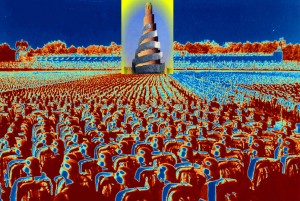Genesis 11:1-9
1 The whole earth had one language and the same words… 4 Then they said, “Come, let’s build us a city with a tower with its top in the heaven, so that we will make us a name, lest we be scattered abroad upon the face of the whole earth…6 And the Lord said, “Behold, it is one people with one language for everyone and this they begin to do. And now nothing will prevent them to accomplish what they plan. 7 Let us go down, and confound their language there, so that they won’t understand each other’s language. 8 So the Lord scattered them abroad from there upon the face of all the earth: and they left off to build the city.
What is the cause of the punishment the “generation of secession”, the people that began building the Tower of Babel?
In my humble opinion they were not punished at all. God rather helped them (and us) to progress.
If we look attentively at this story, we will see that there is no sign of “punishment” in God’s words. These are words that put forward a challenge.
God’s will is to prevent these men to accomplish what they have planned, to build a very tall tower to avoid being scattered (“lest we be scattered abroad upon the face of the whole earth“). We see, indeed, that after confounding the languages “the Lord scattered them abroad from there upon the face of all the earth“.
Why to disperse them? What’s so wrong in letting them be grouped in a single place?
We have to look into the opening verse of the saga: “The whole earth had one language and the same words“. And when God decides to disrupt the plan of those people, He says: “it is one people with one language for everyone“.
The main problem seems to be that humans don’t speak but one language and the same words. There’s no variety, no other ideas other than one conventional opinion. The result is that they do not disperse. Since dispersion means independence of ideas: everyone chooses for himself, thinks for himself, without having to align with the dominant opinion, with the “same words”.
Uniform thinking avoids conflict: no arguments, no need to convince, no confrontation of two different positions. You might say this is the archetypical peace – we all think together the same thing, we all agree without any hesitation.
Nevertheless, this is not a real peace situation. This is rather oppression. When each individual in society thinks and feels exactly the same, there is no room for self-expression: it is a society of robots and not of humans, anymore. This is the goal of totalitarian regimes: to suppress any thoughts beyond the accepted-dictated-only one.
One of the most difficult obstacles to peace and fraternity is the assertion of the existence of one and only truth. A consequence of this is that any other opinion is necessarily false, since it does not align with the only truth.
The story of the Tower of Babel teaches us that the Human Being needs to develop an independent way of thinking. The big and difficult challenge is to achieve peace preserving different positions, without eliminating each other.
A peace of one truth, of one opinion, isn’t but an illusion. The real peace is built when it is possible to accept that there is a different opinion, when the “other one” exists with his/her independent thought. However, not all different opinion is acceptable to build peace: only the one that does not exclude, does not disdain, does not annul the other opinion, is the one that enables recognition of the “other one”, and thus builds peace.
This is a living peace, that changes, that develops. “Peace” of only one opinion is static and any thing that is not like it, causes it to collapse.
A living peace, on the other hand, is a flexible situation that needs to be updated, adapted and thought again and again. Because it is a peace built on difference and not on identity. The “Keli Yakar” (Rabbi Shlomo Efrayim of Luntschitz, Poland of the 16th Ctry.) explains in his exegesis to these verses:
“They thought they will achieve peace by grouping themselves together. But I [says God] know that peace comes from dispersion” (Keli Yakar to Genesis 11:6)
He takes also the words in the Book of Esther: “There is one people dispersed and distributed” (Esther 3:8) and stresses that a real “one people” is the one that succeeds in being one while being scattered:
“It is a real one people when it is scattered and dispersed, when they don’t struggle each one with his fellow person. But if all of them are grouped in one place to escape struggling one nation with another, then they will enter a bigger struggle, an internal war of one against his fellow” (idem, verse 1).
Therefore, I don’t see here no punishment, but a challenge: Not to annul the differences, not to blur or to wash the dissimilarities by words or deeds that do not recognize the difference. On the contrary, we have to accept the difference, the dissimilarity, the boundaries that define myself as somebody else, that define the society as one distinct from others. Together with this, we must respect the difference, the dissimilarity. We must consent to its existence and not to annul it. If I think like you, then I am not myself: I become you. If I respect your thought (even without agreeing with it) and you respect mine, then I give you existence and you give me existence.
It is in this way that there is peace… our task is to permanently renew this peace.
